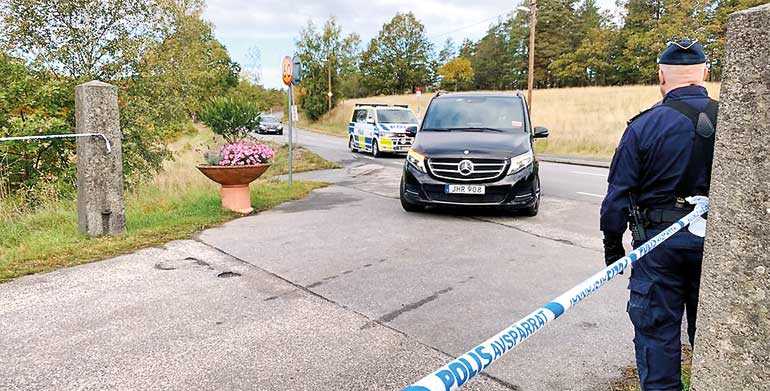Thursday Feb 19, 2026
Thursday Feb 19, 2026
Monday, 7 October 2019 01:48 - - {{hitsCtrl.values.hits}}
STOCKHOLM (Reuters): Working-level nuclear talks in Sweden between officials from Pyongyang and Washington have broken off, North Korea’s top negotiator said late on Saturday, dashing prospects for an end to months of stalemate.
The talks, at an isolated conference centre on the outskirts of Stockholm, were the first such formal discussion since US President Donald Trump and North Korean leader Kim Jong Un met in June and agreed to restart negotiations that stalled after a failed summit in Vietnam in February.
The North’s chief nuclear negotiator, Kim Myong Gil, who spent much of the day in talks with an American delegation, cast the blame on what he portrayed as US inflexibility, saying the other side’s negotiators would not “give up their old viewpoint and attitude.”
“The negotiations have not fulfilled our expectation and finally broke off,” Kim told reporters outside the North Korean embassy, speaking through an interpreter.
The US State Department said Kim’s comments did not reflect “the content or spirit” of more than 8-12 hours of talks, and Washington had accepted Sweden’s invitation to return for more discussions with Pyongyang in two weeks.

A motorcade carrying North Korean delegation heads for Villa Elfvik on the island of Lidingo off Stockholm, Sweden, 5 October – Reuters
“The US brought creative ideas and had good discussions with its DPRK counterparts,” spokeswoman Morgan Ortagus said in a statement. North Korea is also known as the Democratic People’s Republic of Korea (DPRK).
She said the US delegation had previewed a number of new initiatives that would pave the way for progress in the talks, and underscored the importance of more intensive engagement. “The United States and the DPRK will not overcome a legacy of 70 years of war and hostility on the Korean peninsula through the course of a single Saturday,” she added. “These are weighty issues, and they require a strong commitment by both countries. The United States has that commitment.” North Korea’s Kim downplayed the US gestures.
“The US raised expectations by offering suggestions like a flexible approach, new method and creative solutions, but they have disappointed us greatly and dampened our enthusiasm for negotiation by bringing nothing to the negotiation table,” he said.
Swedish broadcaster TV4 said the US Special Representative for North Korea, Stephen Biegun, who led the team, had arrived back at the US embassy in central Stockholm.
The Swedish foreign office declined to give details on the invitation for new talks, or whether Pyongyang had accepted.
Since June, US officials had struggled to persuade North Korea, which is under sanctions banning much of its trade, due to its nuclear program, to return to the table, but that appeared to change this week when the North abruptly announced it had agreed to talks.
On Saturday, negotiator Kim accused the United States of having no intention of solving difficulties through dialogue, but said a complete denuclearisation of the Korean peninsula was still possible.
It would only happen “when all the obstacles that threaten our safety and check our development are removed completely without a shadow of doubt,” he said, in an apparent reference to North Korea’s desire for Washington to ease economic pressure.
On Sunday, China’s President Xi Jinping and the North’s leader exchanged messages to reaffirm the neighbors’ relationship on the 70th anniversary of the establishment of diplomatic ties. China is the North’s only major ally. Xi, who has met Kim five times in the past year, said they had “reached a series of important consensuses, leading China-North Korea relations into a new historical era”, the official Xinhua news agency said.
Kim replied the two leaders would “resolutely safeguard the peace and stability of the Korean peninsula and the world,” Xinhua reported.
The delegation from North Korea arrived in Sweden on Thursday. Analysts have said both countries’ leaders had growing incentives to reach a deal, but it was unclear if common ground could be found after months of tension and deadlock. The readout from the talks did not sound very promising, said Jenny Town, a managing editor at 38 North, a Washington-based North Korea project.
“I think (North Korea’s) expectations were too high that the removal of Bolton would provide more flexibility on what the US wants as initial steps,” she said, referring to Trump’s hardline former aide John Bolton, abruptly fired last month amid disagreements on how to tackle foreign policy challenges.
“While certainly it removes some pressure for an all or nothing deal, it seems the gap between what the two sides want as a baseline and are willing to reciprocate still has not narrowed,” Town added.
An official at South Korea’s presidential office said the talks in Sweden were nevertheless the beginning of negotiations, and that South Korea hoped the United States and North Korea would keep the momentum of the dialogue.
Only a day after announcing the new talks, North Korea said it had test-fired a new ballistic missile designed for submarine launch, underscoring the need for Washington to move quickly to negotiate limits on Pyongyang’s growing arsenal.
Speaking in Athens on a tour of southern Europe while the talks were still underway, US Secretary of State Mike Pompeo had said he was hopeful of progress.
“We are mindful this will be the first time that we’ve had a chance to have a discussion in quite some time and that there remains to be a lot of work that will have to be done by the two teams,” he told a news conference.